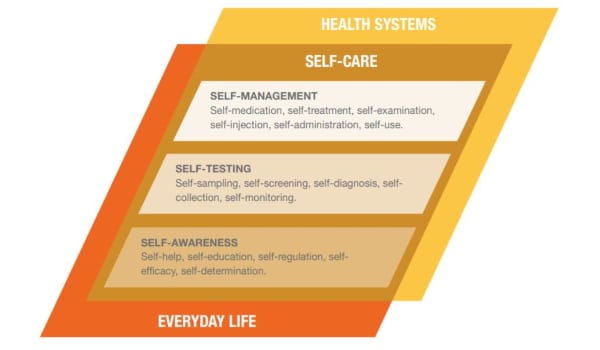
A new publication by the World Health Organization on self-care can be summarised via four key messages published in the BMJ earlier this year:
- Self-care interventions increase choice, accessibility, and affordability, as well as opportunities for individuals to make informed decisions regarding their health and healthcare
- Self-care interventions may also exacerbate inequalities and therefore need to be monitored and, where appropriate, linked with health systems
- Self-care can be thought of using two complementary frames: people-centred and system-centred.
- Normative guidance will be essential to redraw the boundaries of a stronger healthcare system that includes self-care.
The section on self-care with medical abortion pills is taken from the 2015 publication called Health worker roles in providing safe abortion care and post-abortion contraception and covers self-management of the medical abortion process in the first trimester. The recommendations are:
1. Self-assessing eligibility [for medical abortion] is recommended.
2. Managing the mifepristone and misoprostol medication without direct supervision of a healthcare provider is recommended where women have a source of accurate information and access to a health-care provider should they need or want it at any stage of the process.
3. Self-assessing completeness of the abortion process using pregnancy tests and checklists is recommended where both mifepristone and misoprostol are being used and where women have a source of accurate information and access to a healthcare provider should they need or want it at any stage of the process.
4. For individuals undergoing medical abortion with the combination mifepristone and misoprostol regimen or the misoprostol-only regimen who desire hormonal contraception (oral contraceptive pills, contraceptive patch, contraceptive ring, contraceptive implant or contraceptive injections), they can have the option of starting hormonal contraception immediately after the first pill of the medical abortion regimen.
Two additional notes are offered from the 2018 WHO publication Medical management of abortion:
1. When using the combination mifepristone and misoprostol regimen, the medical abortion process can be self-managed for pregnancies up to 12 weeks of gestation, including the ability to take the medications at home, without direct supervision of a health-care provider. Although there is limited evidence for pregnancies beyond 10 weeks, this is an option in circumstances where individuals have a source of accurate information and access to a health-care provider should they need or want it at any stage during the process.
2. The pregnancy tests used to self-assess the success of the abortion process are low-sensitivity urine pregnancy tests, which are different from those commonly used to diagnose pregnancy.
SOURCE: WHO Consolidated Guideline on Self-Care Interventions for Health:
Sexual and Reproductive Health & Rights Executive Summary, 2019
+++
ANALYSIS OF SELF-CARE INTERVENTIONS
Self-care interventions to advance health and well-being: a conceptual framework to inform normative guidance
by Manjulaa Narasimhan, Pascale Allotey, Anita Hardon
BMJ 2019 April;365:l688. DOI: 10.1136/bmj.l688.
This article argues that there is a pressing need for a clearer conceptualisation of self-care to support health policy. The space given to self-care in health policies and national healthcare does not acknowledge how people take care of their health nor the potential self-care has for improving health and wellbeing. However, recent years have seen growing interest in the production of evidence reviews and guidelines for self-care. Where self-care and healthcare intersect there is potential to amplify their beneficial impact on the health of individuals and populations.
The article is one of a series of articles entitled Self care interventions for sexual and reproductive health and rights, which include an editorial, analysis, opinion, and research. They were proposed by the WHO Human Reproduction Programme (HRP) and commissioned by the BMJ. They focus on self-care interventions for sexual and reproductive health and rights and inform the WHO guidance described above. The guidance covers people-centred, evidence-based recommendations for key public health self-care interventions for sexual and reproductive health and rights with a focus on vulnerable populations and settings with limited capacity and resources in the health system.
This series and the guidance call for recognition of the importance of self-care as an integral component of the health system that can support people. With this new collection they hope to stimulate debate, contribute to evidence-informed policies, and raise the profile of self-care.
SOURCE: Preventing unsafe abortion: evidence brief. WHO/RHR/14.09 Rev.1 © World Health Organization 2019.



